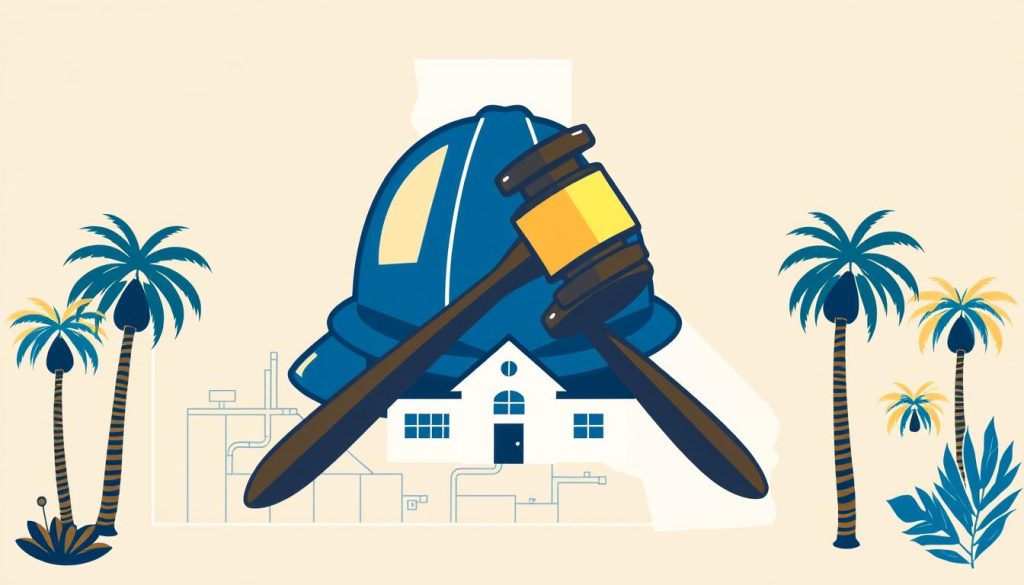Did you know California offers more than 50 kinds of contractor licenses? This variety means understanding the laws is key for both workers and homeowners. California’s rules are complex, covering license needs, contracts, and state laws that guarantee safe, quality buildings.
This guide gives a detailed look at how to follow these rules. Knowing about license requirements and legal duties is a must to do well in this field. By learning these important parts, we help bring professionalism and make customers happier with every building project.
Key Takeaways
- Understanding over 50 contractor licenses necessary for various construction jobs.
- Home improvement projects over $500 require legally binding contracts under California law.
- Limits on down payments for home improvements set at 10% or $1,000, whichever is less.
- Change orders must be documented and agreed upon to modify original contracts.
- Inclusion of contractor details and a performance bond may be necessary to protect homeowners.
- Clear project descriptions and timelines in contracts help set proper expectations.
Introduction to General Contractor Laws in California
Knowing about California contractor regulations is key for contractors and homeowners alike. It’s crucial for any project, big or small. Understanding these rules leads to smoother projects and stronger trust.
Importance of Understanding Contractor Regulations
Learning about contractor regulations helps avoid legal issues. When contractors know about general contractor licensing requirements, they follow the law. Not having a valid license can cause serious problems.
Homeowners should always hire licensed contractors. These professionals have the skills and ethical standards needed for quality work. This assurance builds trust and helps projects succeed.
Overview of Licensing Requirements
In California, contractors must meet strict licensing rules set by the CSLB. They need the right licenses based on their work. It’s important to know the general contractor licensing requirements.
Contractors have to follow steps like applying, passing exams, and keeping their license up-to-date. Not following these steps can have big consequences.
| Requirement | Description |
|---|---|
| License Application | Submit an application to the CSLB with proper documentation. |
| Examinations | Pass required examinations based on the trade. |
| Experience | Provide proof of relevant experience in the field. |
| Background Check | Undergo a criminal background check as part of the application process. |
| Maintain License | Keep licenses active through renewals and continuing education. |
Understanding these licensing requirements helps navigate California contractor regulations well. It ensures we serve our clients right and follow the law.
Licensing Requirements for General Contractors
It’s key to know the licensing rules for general contractors in California. The state has strict rules to ensure top-notch services in construction. We’ll cover the kinds of licenses, how to get one, and what you need to do to keep it.
Types of Contractor Licenses in California
California gives out several contractor licenses for different jobs. The main types are:
- Class A – General Engineering Contractor
- Class B – General Building Contractor
- Class C – Specialty Contractor (of which there are 40 specific categories)
Each license focuses on certain skills. This lets contractors pick what best fits their expertise.
How to Obtain a Contractor License
Getting a general contractor license in California requires a few steps. For starters, applicants must:
- Be at least 18 years old
- Possess a valid Social Security number or ITIN
- Have four years of proven experience
- Secure a contractor’s bond of $25,000 (as of January 2023)
Next, fill in a detailed application and pay a $450 fee. Include proof of your experience and other needed documents. Passing an exam is crucial. Usually, it takes less than two weeks to get the license after the exam.
For specific details, check California licensing resources.
Renewal and Continuing Education for Contractors
Every two years, general contractor licenses in California need renewal. This involves a $450 fee and a renewal form. While there’s no rule on continuous education, staying updated on the industry is vital. It keeps you professional and compliant.
Knowing about California’s contractor licensing helps in following the rules. It also builds trust with clients by showing your dedication and quality.
Legal Responsibilities of General Contractors
General contractors in California have big legal duties. They make sure construction sites are safe and follow state rules. Understanding these duties is key for good project management and avoiding risks. We’ll look at their work scope, building code compliance, and needed insurance and bonding in California.
Scope of Work and Contractual Obligations
Contracts detail what general contractors need to do. They must meet quality and timeline expectations, keeping in line with California’s rules. A good contract helps avoid disputes and spells out what needs to be done. Making all agreements clear is vital to avoid legal issues.
Adherence to Building Codes and Safety Regulations
General contractors must strictly follow California’s building codes and safety laws. If they don’t, they can face fines or delays. They need to keep work sites safe and follow liability laws. Following these rules helps protect everyone involved. For more on this, see the California Labor Code.
Insurance and Bonding Requirements
General contractors need several insurances to protect their business and clients. This includes general liability, professional liability, and builder’s risk insurance. They also must meet California’s bonding requirements. This is crucial for handling the challenges of contractor insurance laws in California. Without the right insurance, contractors risk harming their business and reputation.

Common Legal Issues Faced by Contractors
Contractors often face many legal challenges. These can greatly affect their business. Understanding common legal issues in construction is the first step to avoid problems. This means knowing where disputes or complications might pop up.
Disputes with Clients and Subcontractors
Differences often occur between contractors, clients, and subcontractors about contract terms. These might be about the work quality, project changes, or payment issues. Having clear contracts and good communication helps prevent disputes. It also helps contractors follow contractor liability laws in California. Knowing these laws helps contractors handle their duties well.
Construction Defects and Liability
Construction defects are a big risk for contractors. They can lead to costly liability issues. In California, it’s important for contractors to watch projects closely. This avoids mistakes that could cause big problems. The cost of construction defects can reach millions. So, understanding contractor liability laws in California is crucial. It protects your business and your professional name.
Compliance with Labor Laws
Following contractor labor laws in California is essential. It keeps your business and workers safe. This means following rules about how to treat employees, paying fair wages, and keeping workplaces safe. Not doing this can result in big fines and legal issues. The risks of using unlicensed contractors or wrongly classifying workers show why it’s important to always follow the law on every project.
Knowing these legal aspects helps build a strong contracting business. It helps you deal with disputes and follow important rules. For more tips on avoiding legal problems, contractors can look at common legal issues in construction advice.
Resources for General Contractors in California
Finding the right tools and info for general contractors in California can be tricky. There are lots of professional groups, legal help, and chances to learn more available. These can help contractors grow their skills and follow state laws. By using these resources, contractors can get better at their jobs and stay competitive.
Professional Organizations and Associations
Being part of groups like the Associated General Contractors of California (AGC) and the California Building Industry Association (CBIA) is super helpful. They offer learning materials, training, and networking events. Joining these can help contractors meet others in their field and learn from experienced pros. This is crucial for moving forward in their careers.
Legal Assistance and Advocacy Groups
It’s important to understand the legal side of running a contracting business. There are many groups that provide legal advice for contractors. This helps with following the rules and handling contracts. The Contractor’s Legal Kit is updated often with the latest laws. It helps contractors know what they should do to stay within the law in the industry.
Educational Resources and Training Opportunities
The business world today is always changing, meaning contractors need to keep learning. Websites like Udemy and Contractor State License Schools offer great learning tools. They have lots of study materials and courses to help prepare for the contractor’s license exam. This helps contractors in California keep up with new standards and grow their knowledge.
FAQ
What are the general contractor laws in California?
In California, general contractor laws require a valid license and following state rules. Contractors must meet obligations set by the California Contractors State License Board (CSLB). It’s key for both contractors and homeowners to know these laws. This ensures construction work is both ethical and of high quality.
Why is it important to understand contractor regulations?
Knowing contractor regulations keeps contractors out of legal trouble and helps build trust with clients. Licensed contractors must hit safety and skill standards to do their work legally and well. Homeowners can then be sure their projects are in good hands.
What are the licensing requirements for general contractors in California?
To get a license in California, you must be of a certain age, have experience, and pass exams. There are different licenses like A-General Engineering, B-General Building, and C-Specialty. Each one is for different kinds of work.
What is the process of obtaining a contractor license?
To get a contractor license, fill out an application, send in documents, and pass exams set by the CSLB. Making sure you meet all the requirements is crucial.
How do contractors renew their licenses, and is continuing education necessary?
Contractors renew their license every two years by applying and paying fees. Even though ongoing education isn’t required, it’s a good idea. It helps stay up-to-date with industry rules and compliance.
What are the legal responsibilities of general contractors in California?
Contractors must stick to their contract terms, ensuring their work meets quality and safety standards. Following California’s building codes is a must. They also need insurance and bonding to cover financial losses.
What common legal issues do contractors face?
Contractors often deal with legal problems like client disputes over contracts or work quality. They might also have disagreements over payments with subcontractors, or face liability for construction flaws. Handling these issues early can reduce risks.
How can contractors ensure compliance with labor laws?
Staying up-to-date with laws about employee rights, fair treatment, and pay helps contractors comply. This not only protects them but also makes a better workplace for everyone on a construction project.
What resources are available for general contractors in California?
Contractors have access to groups like the AGC and CBIA for training and networking. Legal help and education resources too can boost their skills and ensure they follow the laws.
Source Links
- https://www.contractorslicensingschools.com/blog/california-home-improvement-contracts-101/
- https://www.contractorslicensingschools.com/blog/business-structures-101-for-california-contractors/
- https://www.levelset.com/construction-contracts/california-construction-contracts-faqs/
- https://new.uslaw.org/wp-content/uploads/2022/02/California_USLAW-Construction_Compendium_2021.pdf
- https://www.lovettlawusa.com/construction-law/contractors-and-subcontractors/contractor-laws-and-requirements/
- https://www.contractorslicenseguru.com/what-you-should-know-about-contractor-licensing-in-california/
- https://www.procore.com/library/california-contractors-license
- https://www.nextinsurance.com/blog/california-general-contractor-license-and-insurance-requirements/
- https://www.callahan-law.com/construction-litigation-key-considerations-for-contractors-in-california/
- https://www.stonesalluslaw.com/business-law/independent-contractor-rights/
- https://www.santaellalaw.com/blog/2017/june/the-california-contractors-state-license-law/
- https://mbkchapman.com/blog/contractor-disputes/
- https://www.sierravistawindowandguttercleaning.com/importance-of-licensed-contractors-in-california/
- https://www.contractorslicensingschools.com/blog/essential-resources-for-california-contractor-license-preparation/
- https://www.cslb.ca.gov/about_us/library/guides_and_publications/
- https://www.contractorsischool.com/learning-resources/how-to-get-your-contractors-license-in-california-guide


